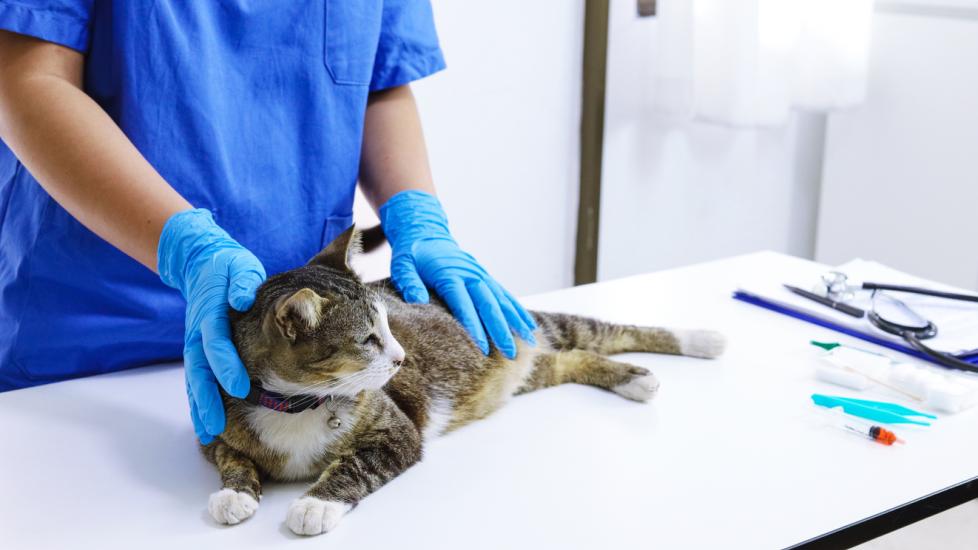Fever in Cats
What Is Fever in Cats?
A cat’s normal body temperature is between 100 F and 102.5 F. But just like humans, cats can run a higher-than-normal body temperature when they are sick—or for other reasons.
A typical fever in a cat is considered a symptom until further diagnosis can confirm what is causing it. However, when a veterinarian can’t find an underlying cause, the cat may be diagnosed with what is called “a fever of unknown origin.”
Fever in cats may be due to:
-
Excitement
-
Anxiousness
-
Pain
-
Sickness
-
Exercise
-
Reaction to certain types of medications
-
Heat exhaustion or heat stroke
An anxious, but otherwise healthy, cat with a 103 F temperature may not be considered feverish. On the other hand, a quiet and lethargic cat that has a 103 F temperature and shows other symptoms of illness may be considered feverish.
A veterinarian usually starts to interpret your cat’s body temperature by:
-
Performing a thorough physical exam
-
Examining your cat’s medical history
If the cause of the fever is not obvious, the veterinarian will then move on to diagnostic testing.
Health Tools
Not sure whether to see a vet?
Symptoms of Fever in Cats
When your cat has a fever, they may:
-
Feel lethargic
-
Have a reduced appetite
-
Hide
-
Avoid activities they normally enjoy
Other symptoms, like vomiting or diarrhea, are possible depending on what is causing a cat’s fever. If your cat has any worrisome symptoms, call your veterinarian for an appointment.
How To Tell If a Cat Has a Fever
In addition to seeing symptoms like reduced activity and appetite, you may suspect a fever if your cat feels warmer to the touch than usual. This can be confirmed at home with a rectal or ear thermometer.
The only accurate way to determine if your cat has a fever is to take their temperature. Rectal temperatures are more accurate than aural (ear) temperatures and are easy to perform if your cat is relatively laid-back. Follow the instructions for either the thermometer to determine when the reading is complete. Any thermometer used on animals should not be used later on people.
Causes of Fever in Cats
Persistent fevers that last more than a day may be caused by many potentially serious health problems, including:
-
Bacterial, viral, or fungal infections affecting almost any organ in the body
-
Parasites
-
Immune-mediated diseases
-
Trauma
-
Inflammatory disorders
-
A side effect of some medications
How Veterinarians Diagnose Fever in Cats
Your veterinarian will first look at your cat’s medical history and ask you to list your cat’s symptoms and give details about their behavior.
Next, your veterinarian will physically examine your cat. This will include a temperature reading using a rectal or ear thermometer.
Sometimes, a physical exam may not show a reason for your cat’s fever and further procedures and lab tests may be needed, such as:
-
Blood test for Feline Leukemia Virus (FeLV)
-
Blood test for Feline Immunodeficiency Virus (FIV)
-
Complete blood count for infection or inflammation
-
Biochemistry panel for abnormal organ function
-
Urinalysis for urinary tract infection and kidney function
-
Fecal examinations
Your veterinarian may also take X-rays or perform an ultrasound to look for abnormalities in your cat’s bones and internal organs.
Treating Fever in Cats
If a specific cause for the fever is found, treatment to address that cause should result in the fever going away. A cat with a fever may also receive:
-
Fluids to treat or prevent dehydration
-
Medications to ease discomfort and bring the fever down
-
Nutritional support
If your cat is running a very high fever or is not eating and drinking, they may have to be hospitalized for treatment and close monitoring. This may include intravenous fluids and injectable medications.
Recovery and Management of Fever in Cats
Many cats respond well to treatment and will recover from a fever within one to five days unless the underlying cause can’t be cured or managed well.
Fever in Cats FAQs
What can cause a fever in cats?
Cats can have a fever for a variety of reasons. A very thorough workup may be necessary to identify the underlying cause, and some reasons, like a small abscess buried deep in the belly, for example, can hard to find. A veterinarian will ask about your cat’s medical history, perform a physical examination, and may recommend further testing to diagnose the cause of the fever.
How long do cat fevers last?
Fevers in cats can last for just a few hours or for many days, depending on the underlying causes and how effectively it can be treated.
What should I do if my cat has a fever?
Call your veterinarian for advice if you think your cat has a fever. Take your cat to the clinic immediately (even if it means going to an after-hours emergency vet) if your cat’s temperature is very high (over 104 F) or they have other serious symptoms like extreme lethargy, difficulty breathing, or severe vomiting and diarrhea.
Can parasites cause fevers in cats?
Yes, parasites can cause fevers in cats. The most common parasites like fleas or intestinal worms usually won’t cause a fever, but other types, including the parasites that cause toxoplasmosis and cytauxzoonosis, can.
Do cats recover from fevers?
Most cats will recover from a fever with appropriate treatment. However, some fevers may be a chronic or recurring problem depending on the underlying cause.
Will a cat’s fever go away on its own?
Some cat fevers may go away on their own. For example, a cat with a mild upper respiratory infection will usually be back to normal in a week or so. However, fevers can also be a sign of a potentially life-threatening health problem. When in doubt, it’s always best to talk to your veterinarian.
Featured Image: iStock.com/charliepix
Help us make PetMD better
Was this article helpful?
